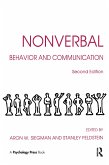Handbook of Prejudice, Stereotyping, and Discrimination
Herausgeber: Nelson, Todd D
Handbook of Prejudice, Stereotyping, and Discrimination
Herausgeber: Nelson, Todd D
- Broschiertes Buch
- Merkliste
- Auf die Merkliste
- Bewerten Bewerten
- Teilen
- Produkt teilen
- Produkterinnerung
- Produkterinnerung
This new edition of this bestselling handbook offers a comprehensive and scholarly overview of the latest research on prejudice, stereotyping, and discrimination.
Andere Kunden interessierten sich auch für
![Motivation and Its Regulation Motivation and Its Regulation]() Motivation and Its Regulation78,99 €
Motivation and Its Regulation78,99 €![Ostracism, Exclusion, and Rejection Ostracism, Exclusion, and Rejection]() Ostracism, Exclusion, and Rejection78,99 €
Ostracism, Exclusion, and Rejection78,99 €![Social Neuroscience Social Neuroscience]() Social Neuroscience78,99 €
Social Neuroscience78,99 €![Nonverbal Behavior and Communication Nonverbal Behavior and Communication]() Nonverbal Behavior and Communication110,99 €
Nonverbal Behavior and Communication110,99 €![Expatriation and Migration: Two Faces of the Same Coin Expatriation and Migration: Two Faces of the Same Coin]() Expatriation and Migration: Two Faces of the Same Coin79,99 €
Expatriation and Migration: Two Faces of the Same Coin79,99 €![The Social Psychology of Stigma The Social Psychology of Stigma]() Todd F. Heatherton / Robert E. Kleck / Michelle R. Hebl / Jay G. Hull (eds.)The Social Psychology of Stigma54,99 €
Todd F. Heatherton / Robert E. Kleck / Michelle R. Hebl / Jay G. Hull (eds.)The Social Psychology of Stigma54,99 €![Model Systems and the Neurobiology of Associative Learning Model Systems and the Neurobiology of Associative Learning]() Model Systems and the Neurobiology of Associative Learning69,99 €
Model Systems and the Neurobiology of Associative Learning69,99 €-
-
-
This new edition of this bestselling handbook offers a comprehensive and scholarly overview of the latest research on prejudice, stereotyping, and discrimination.
Hinweis: Dieser Artikel kann nur an eine deutsche Lieferadresse ausgeliefert werden.
Hinweis: Dieser Artikel kann nur an eine deutsche Lieferadresse ausgeliefert werden.
Produktdetails
- Produktdetails
- Verlag: Taylor & Francis
- 3rd edition
- Seitenzahl: 12
- Erscheinungstermin: 29. November 2024
- Englisch
- Abmessung: 234mm x 156mm x 29mm
- Gewicht: 771g
- ISBN-13: 9781032500577
- ISBN-10: 1032500573
- Artikelnr.: 70945326
- Herstellerkennzeichnung
- Libri GmbH
- Europaallee 1
- 36244 Bad Hersfeld
- gpsr@libri.de
- Verlag: Taylor & Francis
- 3rd edition
- Seitenzahl: 12
- Erscheinungstermin: 29. November 2024
- Englisch
- Abmessung: 234mm x 156mm x 29mm
- Gewicht: 771g
- ISBN-13: 9781032500577
- ISBN-10: 1032500573
- Artikelnr.: 70945326
- Herstellerkennzeichnung
- Libri GmbH
- Europaallee 1
- 36244 Bad Hersfeld
- gpsr@libri.de
Todd D. Nelson is a Professor of Psychology at California State University - Stanislaus. His research focuses on stereotypes and prejudice against older adults (ageism). He is a fellow of the Society for Experimental Social Psychology, and has published several chapters on ageism. Professor Nelson has published widely in the field of prejudice and ageism.
Part 1: Origins of Prejudice 1. Evolutionary approaches to understanding
prejudice, stereotyping, and discrimination 2. Limitations, contestations,
failures, and falsifications of dramatic claims in intergroup Relations
Part 2: Cognitive, Affective, and Motivational Processes in Prejudice
3.The social neuroscience of stereotyping, prejudice, and discrimination
4.Beyond performance: Stereotype and social identity threat in context
5.Prejudice, left and right: Ideological differences and similarities in
prejudice, stereotyping, and discrimination Part 3: Targets of Prejudice
6.Understanding age prejudice and its varied contexts in the 21st century
and beyond 7.Hegemonic masculinity and sexism 8.The stigma of mental
illness 9.Ableism: The time has come to understand bias against people with
disabilities 10.Anti-Fat prejudice, stereotyping, and discrimination 11.The
psychology of contemporary antisemitism 12.Sexual and gender identity
prejudice 13."Go back to your country": Anti-immigrant prejudice,
stereotyping, and discrimination Part 4: Reducing Prejudice 14.Children's
prejudice development and reduction: Challenges and opportunities
15.Interpersonal confrontation of bias 16. How social categorization shapes
intergroup contact: Implications for understanding Group members'
subjective experiences and prospects for achieving attitude Generalization
17. Motivation to respond without prejudice: Antecedents and consequences
prejudice, stereotyping, and discrimination 2. Limitations, contestations,
failures, and falsifications of dramatic claims in intergroup Relations
Part 2: Cognitive, Affective, and Motivational Processes in Prejudice
3.The social neuroscience of stereotyping, prejudice, and discrimination
4.Beyond performance: Stereotype and social identity threat in context
5.Prejudice, left and right: Ideological differences and similarities in
prejudice, stereotyping, and discrimination Part 3: Targets of Prejudice
6.Understanding age prejudice and its varied contexts in the 21st century
and beyond 7.Hegemonic masculinity and sexism 8.The stigma of mental
illness 9.Ableism: The time has come to understand bias against people with
disabilities 10.Anti-Fat prejudice, stereotyping, and discrimination 11.The
psychology of contemporary antisemitism 12.Sexual and gender identity
prejudice 13."Go back to your country": Anti-immigrant prejudice,
stereotyping, and discrimination Part 4: Reducing Prejudice 14.Children's
prejudice development and reduction: Challenges and opportunities
15.Interpersonal confrontation of bias 16. How social categorization shapes
intergroup contact: Implications for understanding Group members'
subjective experiences and prospects for achieving attitude Generalization
17. Motivation to respond without prejudice: Antecedents and consequences
Part 1: Origins of Prejudice 1. Evolutionary approaches to understanding
prejudice, stereotyping, and discrimination 2. Limitations, contestations,
failures, and falsifications of dramatic claims in intergroup Relations
Part 2: Cognitive, Affective, and Motivational Processes in Prejudice
3.The social neuroscience of stereotyping, prejudice, and discrimination
4.Beyond performance: Stereotype and social identity threat in context
5.Prejudice, left and right: Ideological differences and similarities in
prejudice, stereotyping, and discrimination Part 3: Targets of Prejudice
6.Understanding age prejudice and its varied contexts in the 21st century
and beyond 7.Hegemonic masculinity and sexism 8.The stigma of mental
illness 9.Ableism: The time has come to understand bias against people with
disabilities 10.Anti-Fat prejudice, stereotyping, and discrimination 11.The
psychology of contemporary antisemitism 12.Sexual and gender identity
prejudice 13."Go back to your country": Anti-immigrant prejudice,
stereotyping, and discrimination Part 4: Reducing Prejudice 14.Children's
prejudice development and reduction: Challenges and opportunities
15.Interpersonal confrontation of bias 16. How social categorization shapes
intergroup contact: Implications for understanding Group members'
subjective experiences and prospects for achieving attitude Generalization
17. Motivation to respond without prejudice: Antecedents and consequences
prejudice, stereotyping, and discrimination 2. Limitations, contestations,
failures, and falsifications of dramatic claims in intergroup Relations
Part 2: Cognitive, Affective, and Motivational Processes in Prejudice
3.The social neuroscience of stereotyping, prejudice, and discrimination
4.Beyond performance: Stereotype and social identity threat in context
5.Prejudice, left and right: Ideological differences and similarities in
prejudice, stereotyping, and discrimination Part 3: Targets of Prejudice
6.Understanding age prejudice and its varied contexts in the 21st century
and beyond 7.Hegemonic masculinity and sexism 8.The stigma of mental
illness 9.Ableism: The time has come to understand bias against people with
disabilities 10.Anti-Fat prejudice, stereotyping, and discrimination 11.The
psychology of contemporary antisemitism 12.Sexual and gender identity
prejudice 13."Go back to your country": Anti-immigrant prejudice,
stereotyping, and discrimination Part 4: Reducing Prejudice 14.Children's
prejudice development and reduction: Challenges and opportunities
15.Interpersonal confrontation of bias 16. How social categorization shapes
intergroup contact: Implications for understanding Group members'
subjective experiences and prospects for achieving attitude Generalization
17. Motivation to respond without prejudice: Antecedents and consequences








